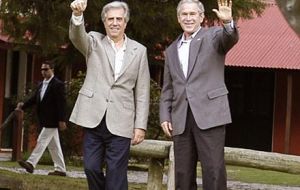MercoPress. South Atlantic News Agency
Argentina denies any ‘war hypothesis’ with Uruguay over controversial pulp mill
 Former president Vazquez and George W Bush
Former president Vazquez and George W Bush Argentine officials reacted strongly to remarks from former Uruguayan President Tabare Vazquez who revealed that during the prolonged diplomatic conflict with Argentina over the construction of the Botnia-UPM pulp plant, he feared the situation could have led to an armed confrontation.
Vazquez further revealed that he contacted former president George Bush and Secretary of State Condoleezza Rice, requesting advice and support, which was corresponded since Uruguay was considered “a reliable friend and partner” of the US.
“We never analyzed, not even remotely the possibility of an armed conflict”, said Alberto Fernandez, Argentine cabinet chief from 2003 to 2008.
The dispute over the construction of the pulp mill lasted approximately seven years until 2010, from the moment Argentina questioned Uruguay’s decision to allow the construction of a pulp mill, possibly contaminating, along a shared river.
Uruguay was also accused of not formally informing its neighbour of the major investment, in spite of the bilateral agreement on the joint administration of the River Uruguay waters which called for consultation and shared decisions.
However Uruguay rejected point blank the Argentine position until the contentious issue was ruled by the International Court of Justice in The Hague which sentenced there was no contamination evidence, although as neighbours the two countries should discuss and agree on the issue.
“With his statements Vazquez is showing he is a parochial, domestic, suburban person completely ignorant of International Law and international policies”, said the former Argentine Foreign Affairs minister Rafael Bielsa.
The Argentine official said that Vazquez “has no word” and underlined the Argentine approach to the dispute.
“Faced with events of the time, I feel great ease and satisfaction at the way Argentina managed the situation acting with great serenity, patience and abiding by the rule of the law. Uruguay did not act in the same way with us”, added Bielsa.
Vazquez during a political chat with a group of students was quoted saying that “we had a very serious conflict with Argentina…And a president has the obligation of analyzing all possible scenarios given a specific problem”.
“And I displayed in my mind all those possible scenarios, from a situation where nothing happens to that conflict hypothesis of an armed conflict”, according to Vazquez in an interview with a Montevideo newspaper.
Vazquez said he met with the three Armed Forces commanders to consider the situation since the Argentine Army was involved in military exercises across the river Uruguay, in an area close to the pulp mill and where they had never been involved in such display of force.
Apparently the Army commander suggested “we organize for a guerrilla war” and the Air Force said it had only five aircraft operational and fuel for 24 hours, and anyway “if we send them across, we’d never see them again”, recalled Vazquez.
Faced with this scenario the former president said that in the midst of the conflict he travelled to the US where he contacted US Secretary of State Condoleezza Rice on the issue, requesting President George W Bush be informed.
Vazquez had met Ms Rice in Santiago during a regional summit.
“It was a very special moment in the bilateral relations between Uruguay and Argentina over the blocking of bridges by pickets…but Uruguay faced with the situation also needed support”, said the first elected president of the ruling catch-all left leaning coalition.
The controversy became particularly acrimonious when environmentalists from the neighbouring argentine city of Gualeguaychú, across from Fray Bentos where the Botnia-UPM pulp mill was built, blocked an international bridge, a protest which lasted three and a half years.
“I don’t recall President Bush playing any part in the conflict. Not even a word or suggestion from Bush. All this sounds to me that we were looking at different movies”, added Alberto Fernandez.
Currently both countries comply with a joint monitoring of the plant and waters of the River Uruguay as part of the agreements which enabled to end the conflict, implemented by Uruguay’s Jose Mujica and Argentina’s Cristina Fernandez.




Top Comments
Disclaimer & comment rulesCommenting for this story is now closed.
If you have a Facebook account, become a fan and comment on our Facebook Page!